|

On eBay Now...
1987 Israel CULT FILM Movie RARE POSTER Yehuda Barkan ABA GANUV Hebrew JUDAICA For Sale

When you click on links to various merchants on this site and make a purchase, this can result in this site earning a commission. Affiliate programs and affiliations include, but are not limited to, the eBay Partner Network.

1987 Israel CULT FILM Movie RARE POSTER Yehuda Barkan ABA GANUV Hebrew JUDAICA:
$136.30
DESCRIPTION : Up for sale is an almost 35 years old RARE and ORIGINAL Jewish - Judaica MOVIE POSTER for the ISRAEL 1987 PREMIERE ofthe legendary ISRAELI CULT FILM , One of the best known , Popular and beloved BOUREKAS FILM - \" ABA GANUV \" , The film was directed by one of the main experts of the BOUREKAS FILMS , The legendary , recently deceasedYEHUDA BARKAN who also stars at the main role as the skipper .Size around 27\" x 38\" ( Not accurate ) . Printed on chromo paper. The condition is quite reasonable . Imperfections such as creases , Folds - However , Nothing which a framed glass wouldn\'t hide. ( Pls look at scan for accurate AS IS images ) Poster will be sent rolled in a special protective rigid sealed tube. PAYMENTS : Payment method accepted : Paypal& All credit cards. SHIPPMENT :SHIPPworldwide via registered airmail $ 29 ( $12 Israeli domestic shipp only with buy it now - Not with best offers ) . Poster will be sent rolled in a special protective rigid sealed tube. Handling around 5-10 days after payment. Yehuda Barkan (Hebrew: יהודה ברקן; born March 29, 1945) is an Israeli actor, film producer, film director and screenwriter. Yehuda Ezekiel Berkowitz (later Barkan) was born in Netanya. He studied at the Bialik and ORT in schools in Netanya. During his military service in the IDF Barkan served in a Combat Engineering Corps unit and the Northern Command Military band. After his military service, Barkan joined the Dizengoff Command Band (להקת פיקוד דיזנגוף), a band which was based on the characteristics of an Israeli military band, which was composed of veteran members of military bands whom performed songs and skits. In the early 1970s, Barkan participated in a sketch on the Israeli radio show Hamim VeTaim (חמים וטעים) in which Barkan and his colleagues, Moshe Timor, Shlomo Bar-Aba and others, made live prank calls. This became the inspiration for his later practical joke films. In 1975 Barkan got married. From his first marriage Barkan had three children. During the 1980s Barkan married again. In November 2008 Barkan was arrested by the Israeli Tax Authority on suspicion of tax evasion.[1] At the beginning of the 2000s, Barkan became a Baal Tshuva, got married for the third time and moved to the religious moshav Beit Gamliel with his family. From his first marriage Barkan has four children.[2] Film career During the 1970s and 1980s Barkan participated in many Israeli \"Bourekas films \", among them Lupo!, Lupo in New York, Katz V\'Carasso, Charlie Ve\'hetzi, Hagiga B\'Snuker, Bo Nefotzetz Million and more. Other films he appeared in during that time include among others: Malkat Hakvish (1971) where he played alongside Gila Almagor, in Menachem Golan\'s film Attack at Dawn (1970) and in the film adaptation of the novel He Walked Through the Fields (1967) where he played alongside Assi Dayan. During the 1980s Barkan began to direct and produce films, including the candid camera film Hayeh Ahaltah Otah (which he directed together with Yigal Shilon), Nipagesh Bachof, Nipagesh Basivuv, Matzlema Bli Busha and Geveret Tiftehi, Ze Ani). Also during the 1980s, Barkan produced and directed films comic drama films, most notably the Abba Ganuv film series and the film Neshika Bametzach released in 1990 where he played alongside Michal Yanai. In 1993 Barkan filed for bankruptcy due to the debts he accumulated after the failure of his 1993 film Mehapeset Baal Al Arba. In 1994, shortly after the start of Israeli commercial television channel Channel 2 began its broadcasting, Barkan started hosting his own practical jokes show called Lo Dofkim Cheshbon. The show was cancelled shortly after. In 1999 Barkan participated in two last films: Look into my eyes and Volcano Junction, in which he played small supporting roles. In 2003 Barkan part in the documentary film Zehirut Matzlema along with Nurit Geffen and Josie Katz. In 2004 Barkan played in the drama series Ahava BaShalechet along with Leah Koenig. - Bourekas films (Hebrew: סרטי בורקס) were a genre of Israeli-made movies popular in Israel in the 1960s and 1970s. Haaretz film critic Uri Klein describes Bourekas films as a \"peculiarly Israeli genre of comic melodramas or tearjerkers... based on ethnic stereotypes.\"[1] They were \"home-grown farces and melodramas that provided escapist entertainment during a tense period in Israeli history.\"[2] The term is said to have been coined by the Israeli film director Boaz Davidson, the creator of several such films, as a play-on-words on the \"spaghetti western\" genre, known as such because that particular Western sub-genre was produced in Italy. Bourekas is also a notable dish from Israeli cuisine. Gefilte-fish Films \"Gefilte-Fish\" films, also known as \"bourekas for Ashkenazim\" are a maringal group of Bourekas films that feature Ashkenazi protagonists and ghetto folklore.[3] Some films in this sub-genre include: Kuni Lemel, 1968 (Israel Bekers) Lupo, 1970 (Golan) Kuni Lemel in Tel Aviv (1976) (Yoel Zilberg) Lupo in New York (1976) (Davidson) Hershele, 1977 (Yoel Zilberg) Marriage Tel Aviv Style, 1980 (Yoel Zilberg) Aunt Klara (HaDoda Klara), 1977 (Avraham Hefner) Themes The main theme in most Bourekas films is the conflict between ethnic cultures in Israel, in particular between the Mizrahi Jews and the Ashkenazi Jews. The hero is usually a Mizrahi Jewish man, almost always poor, canny and with street smarts, who comes into conflict with the institutions of the state or figures of Ashkenazi origin - mostly portrayed as rich, conceited, arrogant, cold-hearted and alienated. In many of these films, actors imitate different Hebrew accents, especially that of Jews originating from Morocco, Persia and Poland. They employ slapstick humour, alternate identities and a combination of comedy and melodrama. In a paper entitled \"A Shtetl in Disguise: Israeli Bourekas Films and their Origins in Classical Yiddish Literature,\" Rami Kimchi claims that the portrayal of Israeli Mizrahi communities in these films bears a strong resemblance to the portrayal of the 19th century East European shtetl by classic Yiddish writers.[4] Kimchi attributes the commercial success of these films to their \"hybridity,\" i.e. they were Israeli/Mizrahi and Diasporic/Ashkenazi at one and the same time, thereby satisfying the political, sociological, and psychological needs of both Mizrahi and Ashkenazi audiences in Israel.[5] He believes eleven films produced between 1964 and 1977 make up the corpus of the genre.[6] Actors and directors Bourekas films were highly successful in Israel during the 1960s and 1970s, but were also criticized for being shallow. Some of the main actors and directors were: Ze\'ev Revach - an actor and director who participated in many popular Bourekas film comedies such as Hagiga B\'Snuker (1975), Charlie Ve\'hetzi (1974), Rak Hayom (1976), Gonev Miganav Patoor (1977), Ta\'ut Bamispar (1979), Ha-Muvtal Batito (1987), Lo La\'alot Yoter (1979), Sapar Nashim (1984), Pa\'amaim Buskila (1998), and more. Revach eventually became the person which is most identified with the Bourekas films and continued to create those films until the end of the 1980s. George Obadiah - a director who created many melodramas which were influenced (and at times copied) from the Turkish cinema. The most prominent of his films are : Ariana (1971), Nurit (1972), Sarit (1974), Na\'arat haparvarim (1979), and more. Obadiah created also comedies like Nahtche V\'Hageneral (1972), Fishke Bemilu\'im (1971) and Koreyim Li Shmil (1973). Yehuda Barkan - an actor and director who participated in many Bourekas films such as Lupo (1970) and Lupo B\'New York (1976), Katz V\'Carasso (1971), Charlie Ve\'hetzi (1974), Hagiga B\'Snuker (1975), Bo Nefotzetz Million (1977) and more. Barkan also played in the 1980s Abba Ganuv film series and directed them. Boaz Davidson - a director of many Bourekas film comedies such as Charlie Ve\'hetzi (1974), Hagiga B\'Snuker (1975), Mishpahat Tzan\'ani (1976), and Lupo B\'New York (1976). His films Charlie Ve\'hetzi and Hagiga B\'Snuker had a \'revival\' in the 1990s and a status of Israeli cult film status. Yosef Shiloach - Played in several Bourekas film comedies, in parallel with a set of dramatic and more serious roles he played in a variety of Hollywood films. A character which is identified with him in particular is \"the Persian\" - a somewhat sensual grotesque who possesses a strong Persian accent. Tuvia Tzafir - Played in several Bourekas films, particularly in the role of the grotesque \"Ashkenazi\" character. Menahem Golan - a director and producer of many fiscally successful Bourekas films such as Lupo (1970), Fortuna (1966), My Margo (1969), and Queen of the Road (Malkat haKvish)\" (1971). Films Several prominent Bourekas films are listed below in chronological order of production. Sallah Shabbati (1964) - directed by Kishon Fortuna (film) (1966) - directed by Menahem Golan Moishe Vintelator (1966) - directed by Uri Zohar 999 Aliza Misrahi (1967) - directed by Menahem Golan Kuni Lemel (1968) - directed by Israel Bekers Ha-Shehuna Shelanu (1968) Our Neighborhood (HaShkhuna Shelanu) (1968) - directed by Uri Zohar My Margo (1969) - directed by Menahem Golan Queen of the Road (Malkat haKvish) (1971) Salomonico (1972) Ha-Meshahnei\'a Ba\'am (1973) Haham Gamliel (1973) Kazablan (1974) - a story of a young Mizrahi man who falls in love with an Ashkenazi girl, starring Yehoram Gaon Hagiga B\'Snuker (1975) Yi\'ihiyeh Tov Salmonico (1975) -with Reuven Bar-Yotam Critical Reviews Although Bourekas films were some of the most successful in the box office, they typically received terrible reviews from critics. They were cited as \"low-brow\" and \"vulgar\", with great concern as to this genre of film representing the Israeli people abroad.[7] In critiquing Sallah Shabbati Biltzki in Al hoMishmar said, \"Because parties in Israel are presented not only in the distorted mirror of a distorted humor but also in the ugly mirror of the image of public and organizational life...One has to think twice if such a film should represent us abroad.\"[8] Demise of the genre At the end of the 1970s, the popularity of the Bourekas film declined. In the 1980s, Israeli films became more politically charged and began to address controversial topics. Nowadays many of the Bourekas films have gained cult status in Israel. Hagiga BaSnuker (aka - Party at the Snooker; Hebrew: חגיגה בסנוקר; originally simply Snooker) is a 1975 Israeli cult movie, one of the classic Bourekas films. The movie was directed by Boaz Davidson and stars Israeli comedians Ze\'ev Revach, Yehuda Barkan and Yosef Shiloah. Cast Yehuda Barkan - Gavriel (Gavri) Levi/Azriel Levi (Hebrew: גבריאל\\עזריאל) Ze\'ev Revach - Hannukah (Hebrew: חנוכה) Yosef Shiloah - Salvador (Hebrew: סלבדור) Nitza Shaul - Yona (Hebrew: יונה) Tuvia Tzafir - Mushon (Hebrew: מושון) Ya\'ackov Banai - Rabbi Yosef Shemesh Arieh Elias - Halfon (Hebrew: חלפון) Abraham Ronai - The contractor (Hebrew: הקבלן) Talia Shapira - Riki (Hebrew: ריקי) music by Matti Caspi Plot The story is about two twin brothers, Azriel and Gavriel (both played by Yehuda Barkan). Azriel is a shy and religious Jew who works in a fruit shop in Jaffa. Gavriel, is a hoodlum and a good-for-nothing hustler who runs a Snooker Bar. Gavriel and his friend Hanuka make easy money by swindling innocent people into gambling on Snooker games. One day Gavriel is forced to renew contact with his brother, because he is in trouble with a gangster who won the bet on a snooker game, and the only way to pay is by selling the family estate which is co-owned by Gavriel and his brother Azriel. Before you read this post, I want you to make sure that you have a platter of bourekasim at hand. Cheese, potato, mushroom, I don’t care (although I’m a potato bourekas man myself), but it just wouldn’t be appropriate to discuss sirtei bourekas without the accompaniment of the food that gave its name to an entire genre Okay. Now that you’re adequately equipped with flakey sesame seed-y stuffed Mediterranean goodness, it’s time to learn about that uniquely Israel cinematic creation, the seret bourekas – the bourekas movie! The bourekas movies were perhaps the first major Israeli cultural acknowledgment of the Mizrachi population, whose artistic output and cultural identity had been largely shunted aside by the then-dominant axis, which was interested more in filling up towns in Israel’s sparsely populated regions than listening to musika mizrachit. The classic bourekas movies grew out of a collaboration between generally Ashkenazi writers and directors (Menachem Golan, Boaz Davidson) and Sephardi/Mizrachi comedians and actors (Ze’ev Revach, Yehuda Barkan, Yehoram Gaon, Shaike Levi, Aryeh Elias) and balanced light, goofy comedy (vicious satire like that of Ephraim Kishon was generally absent) with simple love stories, often between a tough Sephardi boy with a heart of gold from the wrong side of the tracks and an Ashkenazi girl whose parents don’t want her to be seen with an ars. They usually end with all sides reconciling in time for the inevitable wedding, because in the world of sirtei bourekas, love always triumphs, which is part of what makes them so endearing. The undisputed king of the genre, and a prime contender for most beloved Israeli movie ever, is the 1975 classic Chagigah b’Snooker. Snooker has become a pillar of Israeli pop culture, which is readily apparent to anyone keeping their eyes open: go into any small Israeli workingman’s restaurant or falafel kiosk or bakery from Metulla to Eilat, and you’re likely to see a big print of a bug-eyed black hatter with bottlecap lenses stuffing his face with ktzitzot – a tribute to the movie’s most hilarious scene.Chanukah (Ze’ev Revach) and Gavriel (Yehuda Barkan), a pair of generally disreputable bums, own a Tel Aviv beachfront cafe and pool hall called “Moadon Snooker,” which seems to exist mostly so that Chanukah can trick customers into betting big money against Gavri in a game of snooker – Gavri, of course, is a bona fide pool champ and always cleans up. But one day, they make the mistake of conning the nephew of an expatriate Israeli mobster named Salvador, and Salvador comes to the Snooker for revenge and bests Gavri in a game, leaving Chanukah and Gavri owing him a massive amount of money.Chanukah wants Gavri to pay the debt by selling the valuable family home, which sits on land intended for development, but, in a deliciously only-in-the-movies plot twist, Gavri’s deceased father specified in his will that the house could only be sold once Gavri’s brother Azriel get married. While Gavriel is a thug and an ignoramus, Azriel is a modest, humble, and extremely pious fruit seller who takes care of stray puppies in his spare time – and also Gavri’s twin. Meanwhile, Salvador is trying to get his blockheaded nephew Moshon into an arranged marriage with Yona (Nitza Shaul), the lovely daughter of a prominent rabbi – but Yona loves Azriel, who is too shy to reveal his feelings even though his religiosity and good-heartedness make him the perfect match for the rabbi’s daughter.Hijinks ensue.The movie is essentially a vehicle for Ze’ev Revach to do what Ze’ev Revach does best – dress and act ridiculously. Chanukah dresses as a woman (Israelis love drag for some reason) and tries to seduce Salvador and, most memorably, disguises himself as the Jerusalem matchmaker and rabbi Chanukah Ben Moshe Halevi to try to get the rabbi to agree to letting Azriel marry his daughter. Except Chanukah doesn’t really know enough about Judaism to be a successful rabbi impersonator, and accidentally invites both Gavriel-posing-as-Azriel and Azriel himself to meet with the rabbi. Did I mention hijinks ensuing?Like most bourekas movies, Snooker mines the rich tradition of Jewish comedy, mixing the aforementioned drag with heavy doses of slapstick, wordplay and jokes about Judaism. In fact, instead of focusing on the Ashkenazi/Sephardi divide as many bourekas movies do, Snooker (which features next to no Ashkenazi characters) is mostly a humorous protrayal of the clash between secular and religious Israel, as the Israeli-ized, secular Gavri and Chanukah bump up against the Old Country traditions of the rabbi, with the rest of the characters trapped somewhere in between.If you’re not convinced to go out and see this movie right now, allow me to reiterate: it’s hilarious, it’s heartwarming, and it’s safe for the whole family (unless your children are well acquainted with the amusingly vulgar Arabic profanity Chanukah likes to throw around). And it has a great soundtrack! It’s not the king of sirtei bourekas for nothing.Hagiga ba Snooker, or \"snooker celebration\" in Hebrew, is a classic Israeli movie from 1975. Gavri (Yehuda Barkan) and Hannuka (Ze\'ev Revach) are two small time pool hall owners and hustlers who try to hustle a former Israeli snooker king and suspected Mafia boss. (Note: snooker is another name for the game of pool or billiards). To pay off the money they owe him, they decide to sell Gavri’s family’s house. But they can\'t unless they first marry Gavri\'s twin brother. But Gavri\'s twin brother is interested only with the rabbi\'s daughter whom he is madly in love with. Little do they know that the snooker king wants to marry off his nephew to the rabbi\'s daughter as well. Hilarity ensues.This movie is both charming and cheesy. Some scenes are embarrassingly predictable, but that\'s part of the fun which makes it a cult classic. For me, the film invokes the type of low-budget movies which used to be aired in America either at 2pm on a Tuesday afternoon or 2am on a Saturday night. It was fun to see a movie with so many Jewish and Israeli references but without those references being the focus of the movie.Hagiga ba Snooker contains no nudity, violence, or racism although there are one or two swear words both in English and Hebrew. The ending is happy without any deaths or any religious or political message.One scene that has been immortalized on posters in falafel shops throughout the country is that of Hannuka dressed up as the matchmaker in a black hat and thick glasses stuffing his face full of food.The movie co-stars Yossi Banai, a well known singer. Alternative titles for this movie include: Hagigah B’Snooker or simply Snooker. Chagiga B’Snooker (1975 – Starring Yehuda Barkan and Tuvya Tzapir. This film exposes the Israeli underside, the mob, as a bunch of nutsos in a madcap film. Yehuda Barkan gives his most hilarious and memorable performance as Snooker huksters try to outsmart the mob and all the craziness that ensues. Although admittedly cheesy humor, it is screened faithfully every year on Israeli TV usually around Yom Haatzmaut (Independence Day). Abba Ganuv (1987) Full Cast & Crew Directed by Jacob Goldwasser ... (as Yankol Goldwasser) Writing Credits Haim Marin ... (screenwriter) Pini Eden ... (idea) Cast (in credits order) Yehuda Barkan ... Yitzhak \'Chiko\' Ben David Alona Kimhi ... Galia Reshef Ben Tzion ... Ben Ben David Keren Mor ... Maggie Weinberg Uri Shamir ... Lawyer Natan Kugler Gita Luka ... Sonia Leni Ravitz ... Sam Weinberg Dan Harden ... Judge Zare Vartanian ... Morduch Yaacov Cohen ... Beber Yarden Ross ... Tina Aryeh Cherner ... Ringo Ilana Berkovitz ... Efrat Reshef Yael Amit ... Shula Dodi Shoshani Arik Eshet Eliezer Applebaum Biko Create a character page for: ? Produced by Yehuda Barkan ... producer Udi Sofer ... executive producer Music by Shlomo Gronich Cinematography by Ilan Rosenberg Film Editing by Anat Lubarsky Casting By Nirit Yaron ... (as Nirit Yaron-Gronich) Production Design by Ariel Glazer Set Decoration by Ariel Glazer Yoni Krol Makeup Department Debby Kleider ... key makeup artist Production Management Assa Lizka ... production manager (as Assa Lizka) Second Unit Director or Assistant Director Yoad Ben Yosef ... second assistant director Avi Mograbi ... first assistant director Sound Department Shabtai Sarig ... sound recordist Yoav Sarig ... boom operator Tamar Shir ... sound editor Stunts Koby Azarly ... stunt coordinator Camera and Electrical Department Effi Agami ... grip Shlomo Avidan ... still photographer Avi Koren ... first assistant camera David Namir ... second assistant camera (as Dudi Namir) Udi Rimer ... gaffer Yehuda Sar-Israel ... lighting technician Joseph Tzirin ... best boy grip (as Yosi Tzirin) Boaz J. Yacov ... best boy grip (as Boaz Yacov) Tzvika Zelinger ... lighting assistant Casting Department Nisim Asulin ... casting: Tiberias Costume and Wardrobe Department Inbal Ba\'al-Teches ... wardrobe mistress Dana Gior ... wardrobe assistant Sara Weiner ... costume advisor Editorial Department Rosa Fleishman ... first assistant editor Tal Gavish ... assistant editor Hagar Gerty ... assistant editor Other crew Shai Adiram ... camp worker Iris Bugamin ... camp worker Talia Cohen ... production secretary Rami Givoni ... camp manager Amnon Ishai ... production assistant Amos Maimon ... legal advisor Osnat Margowsky ... script supervisor Tali Ofer ... production coordinator Dov Peri ... legal advisor Amnon Uri ... production assistant 3221

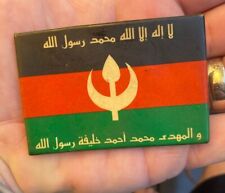
VINTAGE PALESTINE GAZA PEACE PIN BACK BUTTON 1987 ISRAEL ANTI WAR $19.99
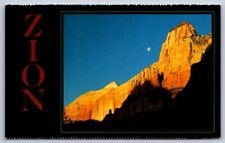
Postcard Chrome Zion National Park Utah The Sentinel Sunrise Moonset 1987 $5.50
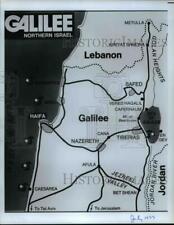
1987 Press Photo Israel - cvb19899 $19.99
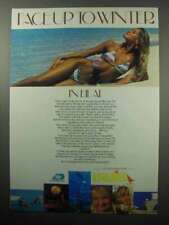
1987 Israel Tourism Ad - Face Up to Winter in Eilat $19.99
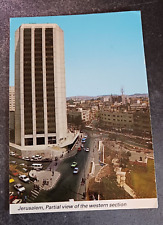
1987 postcard Jerusalem partial view western section Israel posted $5.95
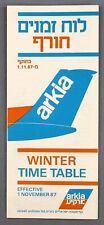
ARKIA ISRAELI AIRLINES TIMETABLE NOVEMBER 1987 ISRAEL SCHEDULE $50.97
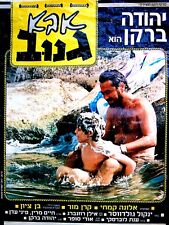
1987 Israel CULT FILM Movie RARE POSTER Yehuda Barkan ABA GANUV Hebrew JUDAICA $136.30
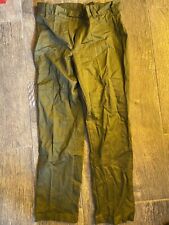
ISRAEL IDF MILITARY ARMY ZAHAL SOLIDIERS Uniform Pants Small Size 1987 $30.00
|